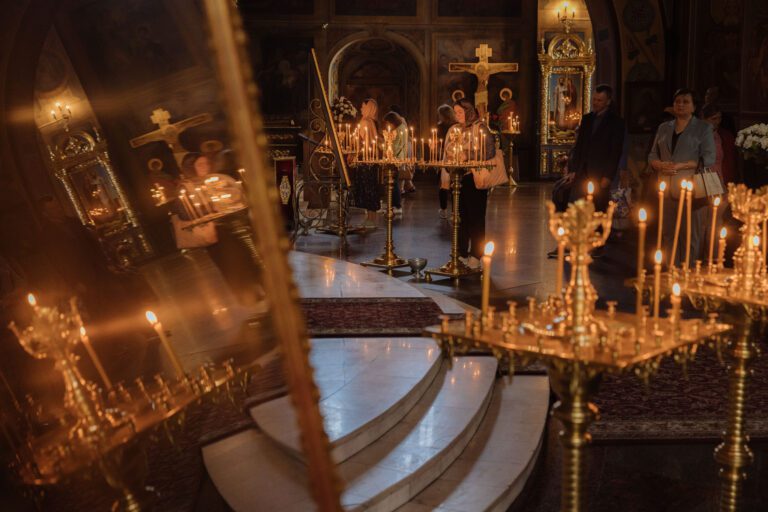The exodus from the parishes of the Moscow Patriarchate has resulted in rapid growth for the OCU, adding the equivalent of a “Cypriot or Macedonian Orthodox Church”, says Viktor Yelenskyi, a former parliamentarian who heads a state commission on the freedom of conscience. A July 2023 letter from 300 priests still belonging to the Ukrainian wing of the Moscow Patriarchate urged its leader, Metropolitan Onufri – who condemned Russian aggression without completely severing ties with Russian Orthodoxy – to officially withdraw his church from the jurisdiction of Moscow.
Maryan Martynenko, OCU’s legal adviser, jokes that the unification of two churches in OCU was “the biggest merger and acquisition process in Ukraine’s recent history.” Bringing the Moscow-aligned churches into the OCU would be an even bigger deal. The Ukrainian wing of the Patriarchate of Moscow does not want to get along with the OCU. But the shrinking herd, the ambiguity of their current status and a government hostile to their ties to Moscow could force the issue.
Metropolitan Klyment – a high prelate of the Ukrainian wing of the Moscow Patriarchate – told me in an interview that “we have every reason to say that we are an independent Church of Moscow”. For all the reasons, except that they haven’t formally broken off their relationship. Indeed, says Father Hovorun, “it is impossible to be clear” about the current status of the Church led by Metropolitan Onufry. “In Moscow they imply that we are always with you”, but in Ukraine they imply the opposite..
What prevents the Ukrainian Orthodox from forming a single Church is partly the polemic waged for years by the Patriarchate of Moscow – in public and among parishioners – against the clergy of the OCU. An OCU prelate tells me that the Ukrainian wing of the Moscow Patriarchate demands, as a condition of rapprochement, that the OCU recognize that many of its priests are not, in fact, priests. The central point of the controversy is the priestly ordinations by a defrocked Ukrainian metropolitan — thus losing the power to ordain — by the Russian Church in the 1990s. As part of the process that led to the independence of the OCU, the Patriarch of Constantinople rescinded the decrees of the Russian Orthodox Church against the Metropolitan. The annulment does not apply retroactively, so bishop-ordained priests were validated by an unprecedented act of dispensation — a decree Klyment calls a mere “certificate.”
Two pieces of legislation currently before the Ukrainian Rada (the national parliament) would effectively ban Ukrainian churches from associating with the Russian Orthodox Church. Rostyslav Povlenko, a Rada member of former President Petro Poroshenko’s European Solidarity party, backs a bill that would outlaw membership of the Russian Orthodox Church and push his Ukrainian wing to reach an agreement with the Patriarch of the OCU. But even supporters of the softer government-backed bill believe it is wrong to treat any relationship with the Russian Orthodox Church as merely spiritual in nature.
“The Moscow Patriarchate doesn’t just help Putin,” says Yelenskyi, whose commission is heavily involved in the life of the Ukrainian Church. “He is a normal participant in aggression” and therefore “we should not allow these structures to operate”. Patriarch Cyril, head of the Russian Orthodox Church, he said, “has developed a heretical teaching very close to jihad”, namely that “if you are killed on the battle line in Ukraine, your sins will be erased”.
And there are occasional suspicions that Moscow-aligned priests are disloyal to the Ukrainian government. A high prelate of the Ukrainian wing of the Moscow Patriarchate was recently sentenced to several years in prison for collaborating with Russia; Young clergymen are among those prosecuted for aiding the invaders. Combining the historic dependence of Russian Orthodoxy on the Russian state, Kirill’s close relationship with the Kremlin, and the enthusiasm the Patriarch employs to defend Putin’s armies, it is understandable that so many Ukrainians see Kirill’s church as the propaganda arm of a hostile state.
homosexuality has been been at the center of Kirill’s campaign to recompose the Russky Mir. A March 2022 speech he defended the war by saying that “pride parades are designed to demonstrate that sin is a variant of human behavior. This is why, to join the club of these countries, it is necessary to organize a Gay Pride. Putin’s own remarks on the subject generally use phrases such as “traditional values”.
Ukrainian support for equal rights for LGBTQ people has been reported to have doubled since the start of the war. Inna Sovsuna parliamentarian sponsoring legislation to legalize civil partnerships between any two adults, puts it this way in a recent interview“Because Putin has made homophobia such a big part of his political agenda and national (Russian) ideology, people automatically associate him with homophobia. Edward Reese, head of communications for the organization Kyiv Pride, says that “Russia is exporting its homophobia and transphobia to…post-Soviet countries” like Ukraine.


